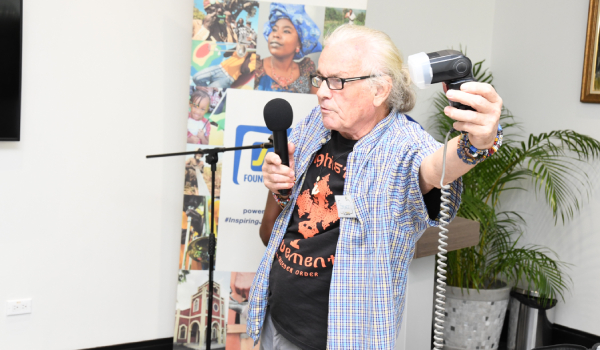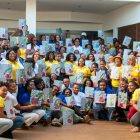Stuart Reeves was only six years-old when he developed a love for the camera, which was first introduced to him by his father, a fireman and hobbyist photographer.
His love for the art form blossomed, and more than six decades later, the educator continues to teach photography and mentor budding photographers.
“Photography is an experience. It is going out and seeing an image and capturing it in the best way, using whatever techniques and processes to get that image. When you have that final image and you realise that is what you saw in your mind and that is what you got in front of you, it can be very rewarding,” he shared.
Reeves, who was born in the United Kingdom, came to Jamaica to complete a one-year tenure as a volunteer teacher in 1970. He was planted at the Glengoffe High School in St Catherine, where he taught Industrial Arts. But what was supposed to be only a gap year for the Englishman after completing his tertiary studies in the UK, turned into half a century, as he put down roots on the island.
The educator taught at various institutions over the years, including the Mico Teachers College (now the Mico University College), Fair Prospect High School in Portland, where he was principal from 1991 to 1995; and Jamaica College, where he served from 1995 -2003. He then served the Ministry of Education as an education officer before retiring in 2004.
Wherever he taught or served, Mr Reeves always tried to engage his students in photography by establishing photography clubs in the institutions he was placed.
Following his retirement, he received the opportunity to do more impactful mentoring of young people, using photography, through the JN Foundation Resolution project in 2010.
“When I was working with the Ministry of Education, I had gone into Rose Town and I heard that there was a photography exhibition going on nearby and that was the JN Foundation Resolution Project. I went across and saw the exhibition and I was really enthralled,” he said.
Mr Reeves was invited to join the team where he was involved in mentoring new cohorts of photography students.
“The JN Resolution Project was an opportunity to engage children. The project had this big thing about advocating with the camera. The students really took to it. We had to teach them what advocacy was and how you advocated using the camera,” he explained.
He recalled that the students were given themes to work with and they were sent to their community to capture images associated with the themes. Workshops were also conducted with the children to teach them about the correct techniques of using the camera and about advocacy.
“They came from diverse communities so when we gave them themes to work with, they interpreted them in their communities, which was important. So, it was not a case where everyone came back with the same types of images. They were really coming back with unique individual images,” he disclosed.
The JN Resolution Project ran for more than a decade. Originally called Youth Zoom, the Resolution Project began in 2004. Each school received digital cameras and participated in workshops in strategic locations across Jamaica. The fundamentals of photography and advocacy, as well as the basics of journalism were taught, and students used the skills they garnered to then tell intricate stories with their cameras; critically examine the issues facing them, and creatively articulate their observations in photographs.
Mr Reeves noted that some exceptional students emerged from the programme, with some moving on to careers involving photography. Among them was Osheenei Zevandell Graham of Grange Hill High School in Westmoreland, who is now an established photographer.
Mr Graham credited the JN Resolution Project for assisting him to develop his craft and gave him the exposure he needed as a student. He was part of the programme for four years.
“The JN Resolution Project gave me the exposure that I needed and it forced me to come out of my shell and be more outgoing and more of a people person,” he said.
He informed that photography is a good way of preserving memories and recording events and that it gave him joy doing so.
Mr Reeves is again engaging budding photographers through the recently launched JN Foundation ‘Greatness through the Lens’ photo-advocacy competition, which invited persons passionate about photography and community advocacy to enter.
The competition, which was launched in October, was conceptualized in celebration of Jamaica’s 60th year of independence under the national theme, “Reigniting a Nation for Greatness”.
It seeks to encourage Jamaican photographers to bring awareness to the unseen ‘helpers/advocates’ whose voluntary service has been engendering positive change in vulnerable communities and promoting environmental preservation.
So far, 50 persons have been shortlisted for the competition, which will culminate in August 2023 during Jamaica’s Independence Day celebrations.
“I’m anxious to see the work they [participants] will come up with. They will be churning out a lot of images and we will give them the necessary guidance and address their weaknesses in photography so they can be better photographers,” said Reeves, who is one of the trainers in the competition. The other trainer is renowned Jamaican international photographer, Radcliff ‘Ruddy’ Roy.




